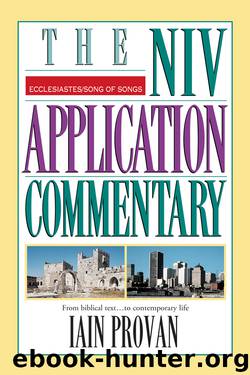The NIV Application Commentary: Ecclesiastes, Song of Songs by Iain Provan

Author:Iain Provan [Provan, Iain]
Language: eng
Format: epub
Tags: REL006060 Religion / Biblical Commentary / Old Testament
ISBN: 9780310872085
Publisher: HarperCollins Christian Publishing
Published: 2014-05-04T16:00:00+00:00
As metaphorical darkness falls across the land, various reactions are to be found among its inhabitants, who are characterized in verse 3 as “keepers of the house,” “strong men,” “grinders,” and “those looking through the windows.” The “strong men” (ʾanše heḥayil) are probably those of high social status (cf. the use of ḥayil in verses like Ruth 2:1 ; Isa. 30:6 ), while the “keepers of the house” are male servants (cf. 2 Sam. 20:3 for the function, albeit that these are females). Likewise, the “grinders” are female servants, whose responsibilities include crushing grain with millstones to make flour for bread (cf. Isa. 47:2 , where a princess becomes a servant), and “those looking through the windows” are likely women of higher social status, who have the leisure to sit and watch the world go by.
These four types of people represent the totality of the community—everyone, whether servant or noble, male or female. The male servants “tremble” in response to the apocalyptic darkness, while the male nobility “stoop” (lit., “make themselves crooked”—the same verbal root as in Ecclesiastes 1:15 ; 7:13 , suggesting a fearful cringing in response to the divinely ordained darkening). The female servants cease their work because their numbers have dwindled—presumably because they have fearfully left their workplaces and retired indoors (cf. v. 4 ). Similarly, the women of leisure “grow dim” (ḥšk, v. 3 ) in response to the darkening (ḥšk, v. 2 ), which in context must refer either to emotional darkness and dread or (more likely, in view of the parallel case of the servants) to abandonment of their viewing point at the windows, so that they are (from the perspective of the observer) lost in the gloom.2
Verse 4a certainly presents us with a picture of general withdrawal inside the home in the face of the terrors outside. One would expect a similar reference to the cessation of normal activity in verse 4b (which the NIV translates in a way that leaves me puzzled), particularly given the similar meanings of Hebrew špl, “become low” (NIV “fades”) and Hebrew šḥḥ, “be bowed down/prostrated” (cf. Isa. 2:11 , 17 , for the two verbs in parallel). It is better to understand the line in this way: “One3 used to rise [in the morning] to the sound of birds, but [now] all the singers [lit., daughters of song] are laid low.” Either this refers literally to the effect of the darkness on the birds, who depart from their normal activity because of the unexpected darkness (cf. the behavior of birds during a solar eclipse), or it refers metaphorically to the female servants, shut indoors and now no longer audible early in the morning as they go about their everyday tasks. All “sound” (qol in both cases) has vanished as its makers have abandoned their everyday activities.
Verse 5 is best taken as a summarizing and climactic review, as well as an expansion in terms of detail, of the apocalyptic events introduced in verses 2–4 . It is introduced by Heb.
Download
This site does not store any files on its server. We only index and link to content provided by other sites. Please contact the content providers to delete copyright contents if any and email us, we'll remove relevant links or contents immediately.
| New Testament | Old Testament |
The Five People You Meet in Heaven by Mitch Albom(2870)
Name Book, The: Over 10,000 Names--Their Meanings, Origins, and Spiritual Significance by Astoria Dorothy(2513)
Real Sex by Lauren F. Winner(2506)
The Holy Spirit by Billy Graham(2452)
The Secret Power of Speaking God's Word by Joyce Meyer(2275)
How The Mind Works by Steven Pinker(2251)
0041152001443424520 .pdf by Unknown(2247)
ESV Study Bible by Crossway(2213)
Ancient Worlds by Michael Scott(2136)
The Meaning of the Library by unknow(2090)
The Gnostic Gospels by Pagels Elaine(2054)
Churchill by Paul Johnson(2032)
The ESV Study Bible by Crossway Bibles(2027)
MOSES THE EGYPTIAN by Jan Assmann(1993)
Jesus by Paul Johnson(1908)
Ancient Near Eastern Thought and the Old Testament by John H. Walton(1869)
The Complete Dead Sea Scrolls in English (7th Edition) (Penguin Classics) by Geza Vermes(1866)
The Nativity by Geza Vermes(1865)
City of Stairs by Robert Jackson Bennett(1863)
